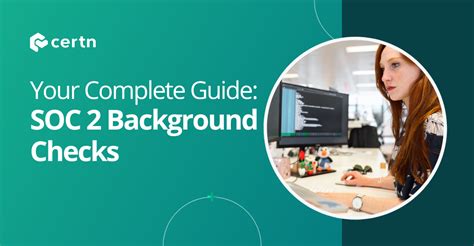As organizations strive to demonstrate their commitment to security, integrity, and trust, obtaining SOC 2 compliance has become an essential benchmark. One crucial aspect of this compliance is the implementation of a robust risk management framework, which includes conducting thorough background checks on employees, contractors, and third-party vendors. In this article, we will delve into the importance of incorporating criminal background checks into your SOC 2 compliance strategy.
Understanding SOC 2 Compliance

SOC 2 compliance is a set of guidelines established by the American Institute of Certified Public Accountants (AICPA) to ensure that organizations manage customer data securely and maintain the confidentiality, integrity, and availability of that data. SOC 2 reports provide assurance that an organization's systems and controls are designed and operating effectively to meet the trust services criteria.
Why Background Checks Matter in SOC 2 Compliance

Conducting thorough background checks is a critical component of SOC 2 compliance. By screening employees, contractors, and third-party vendors, organizations can mitigate the risk of insider threats, data breaches, and other security incidents. Background checks help ensure that individuals with access to sensitive data and systems do not have a history of dishonesty, misconduct, or other red flags that could compromise the organization's security posture.
The Role of Criminal Background Checks in SOC 2 Compliance

Criminal background checks are an essential aspect of the background screening process. These checks involve verifying an individual's criminal history, including convictions, arrests, and pending charges. By conducting thorough criminal background checks, organizations can:
- Identify potential security risks and take steps to mitigate them
- Ensure compliance with relevant laws and regulations
- Protect sensitive data and systems from insider threats
- Maintain the trust and confidence of customers, partners, and stakeholders
Implementing a SOC 2-Compliant Background Check Process

To implement a SOC 2-compliant background check process, organizations should consider the following best practices:
- Develop a comprehensive background check policy: Establish clear guidelines for conducting background checks, including the types of checks to be performed, the frequency of checks, and the criteria for determining eligibility.
- Use a reputable background screening provider: Partner with a trustworthy background screening provider that has experience in conducting SOC 2-compliant background checks.
- Conduct thorough background checks: Verify an individual's identity, employment history, education, and criminal history, as well as conduct checks on relevant professional licenses and certifications.
- Implement a continuous monitoring process: Regularly review and update background check information to ensure that individuals with access to sensitive data and systems continue to meet the organization's security standards.
Benefits of Incorporating Criminal Background Checks into SOC 2 Compliance

Incorporating criminal background checks into SOC 2 compliance can bring numerous benefits, including:
- Enhanced security and risk management
- Improved compliance with relevant laws and regulations
- Increased trust and confidence among customers, partners, and stakeholders
- Better protection of sensitive data and systems
- Reduced risk of insider threats and data breaches
Common Challenges and Solutions in Implementing SOC 2-Compliant Background Checks

Implementing SOC 2-compliant background checks can be challenging, but there are solutions to common obstacles:
- Balancing security with individual rights: Ensure that background checks are conducted in a fair and non-discriminatory manner, and that individuals have the right to contest any adverse findings.
- Managing the cost and complexity of background checks: Partner with a reputable background screening provider that offers cost-effective and efficient solutions.
- Ensuring compliance with relevant laws and regulations: Stay up-to-date with changing laws and regulations, and ensure that background check policies and procedures are compliant.
Conclusion
Incorporating criminal background checks into SOC 2 compliance is a critical step in demonstrating an organization's commitment to security, integrity, and trust. By implementing a robust background check process, organizations can mitigate the risk of insider threats, data breaches, and other security incidents, while also maintaining the trust and confidence of customers, partners, and stakeholders.


What is SOC 2 compliance?
+SOC 2 compliance is a set of guidelines established by the American Institute of Certified Public Accountants (AICPA) to ensure that organizations manage customer data securely and maintain the confidentiality, integrity, and availability of that data.
Why are background checks important in SOC 2 compliance?
+Background checks are essential in SOC 2 compliance as they help mitigate the risk of insider threats, data breaches, and other security incidents by verifying an individual's identity, employment history, education, and criminal history.
What are the benefits of incorporating criminal background checks into SOC 2 compliance?
+Incorporating criminal background checks into SOC 2 compliance can bring numerous benefits, including enhanced security and risk management, improved compliance with relevant laws and regulations, and increased trust and confidence among customers, partners, and stakeholders.
